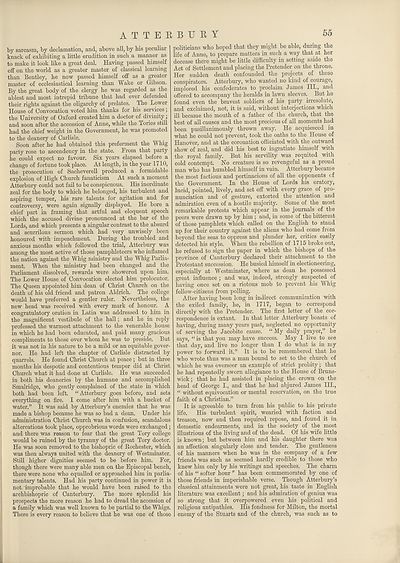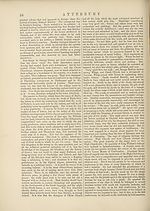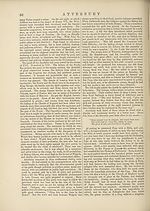Encyclopaedia Britannica > Volume 3, Athens-BOI
(67) Page 55
Download files
Complete book:
Individual page:
Thumbnail gallery: Grid view | List view

55
ATTERBURY
by sarcasm, by declamation, and, above all, by his peculiar
knack of exhibiting a little erudition in such a manner as
to make it look like a great deal. Having passed himself
off on the world as a greater master of classical learning
than Bentley, he now passed himself off as a greater
master of ecclesiastical learning than Wake or Gibson.
By the great body of the clergy he was regarded as the
ablest and most intrepid tribune that had ever defended
their rights against the oligarchy of prelates. Hie Lower
House of Convocation voted him thanks for his services;
the University of Oxford created him a doctor of divinity;
and soon after the accession of Anne, while the Tories still
had the chief weight in the Government, he was promoted
to the deanery of Carlisle.
Soon after he had obtained this preferment the Whig
party rose to ascendency in the state. From that party
he could expect no favour. Six years elapsed before a
change of fortune took place. At length, in the year 1710,
the prosecution of Sacheverell produced a formidable
explosion of High Church fanaticism At such a moment
Atterbury could not fail to be conspicuous. His inordinate
zeal for the body to which he belonged, his turbulent and
aspiring temper, his rare talents for agitation and for
controversy, were again signally displayed. He bore a
chief part in framing that artful and eloquent speech
which the accused divine pronounced at the bar of the
Lords, and which presents a singular contrast to the absurd
and scurrilous sermon which had very unwisely been
honoured with impeachment. During the troubled and
anxious months which followed the trial, Atterbury was
among the most active of those pamphleteers who inflamed
the nation against the Whig ministry and the Whig Parlia¬
ment. When the ministry had been changed and the
Parliament dissolved, rewards were showered upon him.
The Lower House of Convocation elected him prolocutor.
The Queen appointed him dean of Christ Church on the
death of his old friend and patron Aldrich. The college
would have preferred a gentler ruler. Nevertheless, the
new head was received with every mark of honour. A
congratulatory oration in Latin was addressed to him in
the magnificent vestibule of the hall; and he in reply
professed the warmest attachment to the venerable house
in which he had been educated, and paid many gracious
compliments to those over whom he was to preside. But
it was not in his nature to be a mild or an equitable gover¬
nor. He had left the chapter of Carlisle distracted by
quarrels. He found Christ Church at peace ; but in three
months his despotic and contentious temper did at Christ
Church what it had done at Carlisle. He was succeeded
in both his deaneries by the humane and accomplished
Smalridge, who gently complained of the state in which
both had been left. “Atterbury goes before, and sets
everything on fire. I come after him with a bucket of
water.” It was said by Atterbury’s enemies that he was
made a bishop because he was so bad a dean. Under his
administration Christ Church was in confusion, scandalous
altercations took place, opprobrious words were exchanged;
and there was reason to fear that the great Tory college
would be ruined by the tyranny of the great Tory doctor.
He was soon removed to the bishopric of Rochester, which
was then always united with the deanery of Westminster.
Still higher dignities seemed to be before him. For,
though there were many able men on the Episcopal bench,
there were none who equalled or approached him in parlia¬
mentary talents. Had his party continued in power it is
not. improbable that he would have been raised to the
archbishopric of Canterbury. The more splendid his
prospects the more reason he had to dread the accession of
a family which was well known to be partial to the Whigs.
There is every reason to believe that he was one of those
politicians who hoped that they might be able, during the
life of Anne, to prepare matters in such a way that at her
decease there might be little difficulty in setting aside the
Act of Settlement and placing the Pretender on the throne.
Her sudden death confounded the projects of these
conspirators. Atterbury, who wanted no kind of courage,
implored his confederates to proclaim James III., and
offered to accompany the heralds in lawn sleeves. But he
found even the bravest soldiers of his party irresolute,
and exclaimed, not, it is said, without interjections which
ill became the mouth of a father of the church, that the
best of all causes and the most precious of all moments had
been pusillanimously thrown away. He acquiesced in
what he could not prevent, took the oaths to the House of
Hanover, and at the coronation officiated with the outward
show of zeal, and did his best to ingratiate himself with
the royal family. But his servility was requited with
cold contempt. No creature is so revengeful as a proud
man who has humbled himself in vain. Atterbury became
the most factious and pertinacious of all the opponents cf
the Government. In the House of Lords his oratory,
lucid, pointed, lively, and set off with every grace_ of pro¬
nunciation and of gesture, extorted the attention and
admiration even of a hostile majority. Some of the most
remarkable protests which appear in the journals of the
peers were drawn up by him ; and, in some of the bitterest
of those pamphlets which called on the English to stand
up for their country against the aliens who had come from
beyond the seas to oppress and plunder her, critics easily
detected his style. When the rebellion of 1715 broke out,
he refused to sign the paper in which the bishops of the
province of Canterbury declared their attachment to the
Protestant succession, He busied himself in electioneering,
especially at Westminster, where as dean he possessed
great influence ; and was, indeed, strongly suspected of
having once set on a riotous mob to prevent his Whig
fellow-citizens from polling.
After having been long in indirect communication with
the exiled family, he, in 1717, began to correspond
directly with the Pretender. The first letter of the cor¬
respondence is extant. In that letter Atterbury boasts of
having, during many years past, neglected no opportunity
of serving the Jacobite cause. “ My daily prayer,” he
says, “ is that you may have success. May I live to see
that day, and live no longer than I do what is in my
power to forward it.” It is to be remembered that he
who wrote thus was a man bound to set to the church of
which he was overseer an example of strict probity; that
he had repeatedly sworn allegiance to the House of Bruns¬
wick ; that he had assisted in placing the crown on the
head of George L, and that he had abjured James III.,
“ without equivocation or mental reservation, on the true
faith of a Christian.”
It is agreeable to turn from his public to his private
life. His turbulent spirit, wearied with faction and
treason, now and then required repose, and found it in
domestic endearments, and in the society of the most
illustrious of the living and of the dead. Of his wife little
is known; but between him and his daughter there was
an affection singularly close and tender. The gentleness
of his manners when he was in the company of a few
friends was such as seemed hardly credible to those who
knew him only by his writings and speeches. The charm
of his “ softer hour ” has been commemorated by one of
those friends in imperishable verse. Though Atterbury’s
classical attainments were not great, his taste in English
literature was excellent; and his admiration of genius was
so strong that it overpowered even his political and
religious antipathies. His fondness for Milton, the mortal
enemy of the Stuarts and of the church, was such as to
ATTERBURY
by sarcasm, by declamation, and, above all, by his peculiar
knack of exhibiting a little erudition in such a manner as
to make it look like a great deal. Having passed himself
off on the world as a greater master of classical learning
than Bentley, he now passed himself off as a greater
master of ecclesiastical learning than Wake or Gibson.
By the great body of the clergy he was regarded as the
ablest and most intrepid tribune that had ever defended
their rights against the oligarchy of prelates. Hie Lower
House of Convocation voted him thanks for his services;
the University of Oxford created him a doctor of divinity;
and soon after the accession of Anne, while the Tories still
had the chief weight in the Government, he was promoted
to the deanery of Carlisle.
Soon after he had obtained this preferment the Whig
party rose to ascendency in the state. From that party
he could expect no favour. Six years elapsed before a
change of fortune took place. At length, in the year 1710,
the prosecution of Sacheverell produced a formidable
explosion of High Church fanaticism At such a moment
Atterbury could not fail to be conspicuous. His inordinate
zeal for the body to which he belonged, his turbulent and
aspiring temper, his rare talents for agitation and for
controversy, were again signally displayed. He bore a
chief part in framing that artful and eloquent speech
which the accused divine pronounced at the bar of the
Lords, and which presents a singular contrast to the absurd
and scurrilous sermon which had very unwisely been
honoured with impeachment. During the troubled and
anxious months which followed the trial, Atterbury was
among the most active of those pamphleteers who inflamed
the nation against the Whig ministry and the Whig Parlia¬
ment. When the ministry had been changed and the
Parliament dissolved, rewards were showered upon him.
The Lower House of Convocation elected him prolocutor.
The Queen appointed him dean of Christ Church on the
death of his old friend and patron Aldrich. The college
would have preferred a gentler ruler. Nevertheless, the
new head was received with every mark of honour. A
congratulatory oration in Latin was addressed to him in
the magnificent vestibule of the hall; and he in reply
professed the warmest attachment to the venerable house
in which he had been educated, and paid many gracious
compliments to those over whom he was to preside. But
it was not in his nature to be a mild or an equitable gover¬
nor. He had left the chapter of Carlisle distracted by
quarrels. He found Christ Church at peace ; but in three
months his despotic and contentious temper did at Christ
Church what it had done at Carlisle. He was succeeded
in both his deaneries by the humane and accomplished
Smalridge, who gently complained of the state in which
both had been left. “Atterbury goes before, and sets
everything on fire. I come after him with a bucket of
water.” It was said by Atterbury’s enemies that he was
made a bishop because he was so bad a dean. Under his
administration Christ Church was in confusion, scandalous
altercations took place, opprobrious words were exchanged;
and there was reason to fear that the great Tory college
would be ruined by the tyranny of the great Tory doctor.
He was soon removed to the bishopric of Rochester, which
was then always united with the deanery of Westminster.
Still higher dignities seemed to be before him. For,
though there were many able men on the Episcopal bench,
there were none who equalled or approached him in parlia¬
mentary talents. Had his party continued in power it is
not. improbable that he would have been raised to the
archbishopric of Canterbury. The more splendid his
prospects the more reason he had to dread the accession of
a family which was well known to be partial to the Whigs.
There is every reason to believe that he was one of those
politicians who hoped that they might be able, during the
life of Anne, to prepare matters in such a way that at her
decease there might be little difficulty in setting aside the
Act of Settlement and placing the Pretender on the throne.
Her sudden death confounded the projects of these
conspirators. Atterbury, who wanted no kind of courage,
implored his confederates to proclaim James III., and
offered to accompany the heralds in lawn sleeves. But he
found even the bravest soldiers of his party irresolute,
and exclaimed, not, it is said, without interjections which
ill became the mouth of a father of the church, that the
best of all causes and the most precious of all moments had
been pusillanimously thrown away. He acquiesced in
what he could not prevent, took the oaths to the House of
Hanover, and at the coronation officiated with the outward
show of zeal, and did his best to ingratiate himself with
the royal family. But his servility was requited with
cold contempt. No creature is so revengeful as a proud
man who has humbled himself in vain. Atterbury became
the most factious and pertinacious of all the opponents cf
the Government. In the House of Lords his oratory,
lucid, pointed, lively, and set off with every grace_ of pro¬
nunciation and of gesture, extorted the attention and
admiration even of a hostile majority. Some of the most
remarkable protests which appear in the journals of the
peers were drawn up by him ; and, in some of the bitterest
of those pamphlets which called on the English to stand
up for their country against the aliens who had come from
beyond the seas to oppress and plunder her, critics easily
detected his style. When the rebellion of 1715 broke out,
he refused to sign the paper in which the bishops of the
province of Canterbury declared their attachment to the
Protestant succession, He busied himself in electioneering,
especially at Westminster, where as dean he possessed
great influence ; and was, indeed, strongly suspected of
having once set on a riotous mob to prevent his Whig
fellow-citizens from polling.
After having been long in indirect communication with
the exiled family, he, in 1717, began to correspond
directly with the Pretender. The first letter of the cor¬
respondence is extant. In that letter Atterbury boasts of
having, during many years past, neglected no opportunity
of serving the Jacobite cause. “ My daily prayer,” he
says, “ is that you may have success. May I live to see
that day, and live no longer than I do what is in my
power to forward it.” It is to be remembered that he
who wrote thus was a man bound to set to the church of
which he was overseer an example of strict probity; that
he had repeatedly sworn allegiance to the House of Bruns¬
wick ; that he had assisted in placing the crown on the
head of George L, and that he had abjured James III.,
“ without equivocation or mental reservation, on the true
faith of a Christian.”
It is agreeable to turn from his public to his private
life. His turbulent spirit, wearied with faction and
treason, now and then required repose, and found it in
domestic endearments, and in the society of the most
illustrious of the living and of the dead. Of his wife little
is known; but between him and his daughter there was
an affection singularly close and tender. The gentleness
of his manners when he was in the company of a few
friends was such as seemed hardly credible to those who
knew him only by his writings and speeches. The charm
of his “ softer hour ” has been commemorated by one of
those friends in imperishable verse. Though Atterbury’s
classical attainments were not great, his taste in English
literature was excellent; and his admiration of genius was
so strong that it overpowered even his political and
religious antipathies. His fondness for Milton, the mortal
enemy of the Stuarts and of the church, was such as to
Set display mode to:
![]() Universal Viewer |
Universal Viewer | ![]() Mirador |
Large image | Transcription
Mirador |
Large image | Transcription
Images and transcriptions on this page, including medium image downloads, may be used under the Creative Commons Attribution 4.0 International Licence unless otherwise stated. ![]()
| Encyclopaedia Britannica > Encyclopaedia Britannica > Volume 3, Athens-BOI > (67) Page 55 |
|---|
| Permanent URL | https://digital.nls.uk/193651172 |
|---|
| Attribution and copyright: |
|
|---|---|
| Shelfmark | EB.17 |
|---|---|
| Description | Ten editions of 'Encyclopaedia Britannica', issued from 1768-1903, in 231 volumes. Originally issued in 100 weekly parts (3 volumes) between 1768 and 1771 by publishers: Colin Macfarquhar and Andrew Bell (Edinburgh); editor: William Smellie: engraver: Andrew Bell. Expanded editions in the 19th century featured more volumes and contributions from leading experts in their fields. Managed and published in Edinburgh up to the 9th edition (25 volumes, from 1875-1889); the 10th edition (1902-1903) re-issued the 9th edition, with 11 supplementary volumes. |
|---|---|
| Additional NLS resources: |
|

